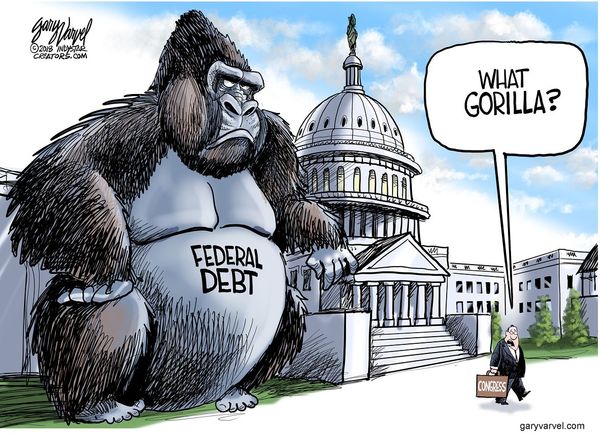When Democrats proposed programs to help Americans (like Obamacare), Republicans loudly proclaimed the country could not afford it, because it would increase the national debt (which they claimed was already too high).
But after taking control of both Congress and the White House, the Republicans passed a huge tax cut bill for the rich -- a bill that has ballooned the national debt to a record amount (and will add a trillion dollars a year now to that national debt). And they don't seem to be worried about the national debt anymore (except as a way to attack Social Security -- which has never added a penny to that debt).
It's an obvious double standard. They only worry about the national debt when Democrats are in power. When they are in power, it is no longer a concern.
What is the public to think? Is the huge national debt a real problem, or not? Here are some thoughts about it from Nobel Prize-winning economist Paul Krugman (pictured) in his NY Times column:
According to ABC News, Mick Mulvaney, Trump’s acting chief of staff, explained to G.O.P. members of Congress why debt wouldn’t get a single mention in the SOTU: “Nobody cares.”
And you know, he’s kind of right. It’s not just Republicans who suddenly seemed to stop caring about debt. For years deficit scolds dominated discourse inside the Beltway; much of the news media treated the urgency of fiscal austerity as an unquestioned fact, abandoning the usual rules of reportorial neutrality and plunging into outright advocacy. Yet since Trump’s election those voices have become oddly muted.
What we’ve just seen confirmed, then, is what some of us were trying to tell you from the beginning: All that wailing about debt was hypocritical.
Republicans never actually cared about debt; they just pretended to be deficit hawks as a way to hamstring President Barack Obama’s agenda. And many centrists have turned out to have a double standard, reserving passionate concern about debt for times when Democrats hold power.
But while the about-face on debt has, as I said, been deeply revealing, there are still two big questions. First, how much should we care about debt? Second, will a double standard continue to prevail? That is, will the deficit scolds suddenly get vocal again if and when Democrats regain power?
On the first question: One surprising thing about the debt obsession that peaked around 2011 is that it never had much basis in economic analysis. On the contrary, everything we know about fiscal policy says that it’s a mistake to focus on deficit reduction when unemployment is high and interest rates are low, as they were when the fiscal scolds were at their loudest.
The case for worrying about debt is stronger now, given low unemployment. But interest rates are still very low by historical standards — less than 1 percent after adjusting for inflation. This is so low that we needn’t fear that debt will snowball, with interest payments blowing up the deficit. It also suggests that we’re suffering from chronic weakness in private investment demand (which, by the way, the 2017 tax cut doesn’t seem to have boosted at all).
So in the past few months a number of prominent economists — including the former chief economist of the International Monetary Fund and top economists from the Obama administration — have published analyses saying that even now, with unemployment quite low, debt is much less of a problem than previously thought.
It’s still a bad idea to run up debt for no good reason — say, to provide tax breaks that corporations just use to buy back their own stock, which is, of course, what the G.O.P. did. But borrowing at ultralow interest rates to pay for investments in the future — infrastructure, of course, but also things like nutrition and health care for the young, who are the workers of tomorrow — is very defensible.
Which brings us to the question of double standards.
You don’t have to agree with everything in proposals for a “Green New Deal” to acknowledge that it’s very much an investment program, not a mere giveaway. So it has been very dismaying to see how much commentary on these proposals either demands an immediate, detailed explanation of how Democrats would pay for their ideas, or dismisses the whole thing as impractical. Was there the same pushback against Republican tax cuts? No.
Look, we’ve seen this over and over again — three times since 1980. Republicans rail against budget deficits when they’re out of power, then drop all their concerns and send the deficit soaring once they are in a position to cut taxes. Then when it’s the Democrats’ turn, they’re expected to clean up the Republicans’ red ink rather than address their own priorities. Enough already.
I’m not saying that Democrats should completely ignore the fiscal implications of their actions. Really big spending plans, especially if they don’t clearly involve investment — for example, a major expansion of federal health spending — will have to be paid for with new taxes. But if and when Democrats are in a position to make policy, they should be ambitious, and not let the deficit scolds scare them into thinking small.


No comments:
Post a Comment
ANONYMOUS COMMENTS WILL NOT BE PUBLISHED. And neither will racist,homophobic, or misogynistic comments. I do not mind if you disagree, but make your case in a decent manner.